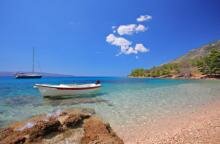Daily Mail amazed by the beauty and diversity of Croatia
« Strange language, strange people and missing vowels give a special charm to this country. The crickets do not sing here, they shout. The sun hits you in the head and a bleating goat suddenly runs out of a bush. In front of us, at the end of a steep, narrow path, shines a small bay in which we hope to find a café and a pebbled beach», writes Letts for the Daily Mail.
The Dalmatian coast is like the Spanish coast in the seventies, with many unnamed villages with just a few houses.
»I am very much enjoying the diversity of Croatia. The old village houses are stil romantic in their simplicity», says the author of the article and reveals how in the past four years he has spent three summers in Croatia, fighting the Croatian language.
Twice in Istria, he calls it a Shakespearean Illiria. Istira is Italianized, he says, but without the Latin showing off, so significantly more peaceful. He spent last summer in the far south of Croatia – on Pelješac Peninsula, where he was especially impressed by Trstenik. «Croatia is charming because it is nothing like the fast, overcrowded, globalized Europe. It is still not fully modernized», writes Letts.
Even though he was in Trstenik in the middle of the season, there were not many tourists there. He pointed out how the prices in Croatia were significantly lower than in England. «The Dalmatian coast is virgin like and it stretches for many kilometres. Most of the houses seem like they are from Napoleon times, even though there are a few newer ugly ones in Orebić, from where you can catch a ferry to Korčula», describes Letts, «Even though most of the continental European coast has been destroyed by money, it is a miracle how bulldozers and multinational hotel chains still have not destroyed this beautiful place», concludes the author.
-
LifeZagreb
-
LifeKrapina
-
LifeKrapina
-
LifeOsijek
-
Medical CenterPagDentistry, Diagnosis, Gynecology, Oftalmology, Orthopedics, Surgery general, Other treatments
-
TreatmentWellness
-
TreatmentWellness
-
TreatmentMassage
-
TreatmentWellness
-
DoctorDentistry
-
DoctorDentistry
-
DoctorDentistry
-
DoctorDentistry
-
LifeCentral Croatia
-
LifePag
-
Medical CenterKrapinaDentistry
-
Medical CenterKrapinaDentistry
-
Medical CenterRijekaDentistry
-
DoctorDentistry
-
Medical CenterZagrebDentistry
-
Medical CenterSplitDentistry
-
AccommodationSplit
-
Medical CenterRijekaDentistry
-
TreatmentAesthetic medicine
-
DoctorEsthetic surgery
-
DoctorAesthetic medicine, Esthetic surgery
-
DoctorEsthetic surgery
-
DoctorEsthetic surgery
-
TransportRijeka
-
Medical CenterOpatijaDentistry
























 Customers
Customers Partners
Partners Features
Features